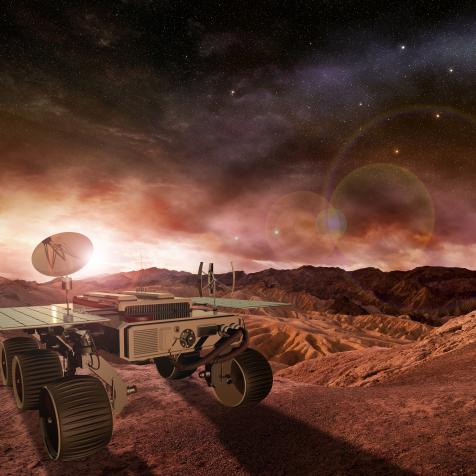
Curiosity Daily Podcast: Saturated Fat Could Kill Your Focus, Animals Have Regional Accents, and Rings Around Mars
Learn about how saturated fat can make it harder for you to focus; why it matters that animals have regional accents; and why Mars used to have rings.
July 13, 2020
Episode Show Notes:
A single meal high in saturated fat could make it harder to focus by Kelsey Donk
- Our ability to focus may falter after eating one meal high in saturated fat. (2020). EurekAlert! https://www.eurekalert.org/pub_releases/2020-05/osu-oat051220.php
- Madison, A. A., Belury, M. A., Andridge, R., Shrout, M. R., Renna, M. E., Malarkey, W. B., Bailey, M. T., & Kiecolt-Glaser, J. K. (2020). Afternoon distraction: a high-saturated-fat meal and endotoxemia impact postmeal attention in a randomized crossover trial. The American Journal of Clinical Nutrition, 111(6), 1150–1158. https://doi.org/10.1093/ajcn/nqaa085
Many Animals Have Regional Accents by Samantha Suarez
- Whales With Caribbean Accents and Other Animal Dialects. (2016, February 27). Nationalgeographic.com. https://www.nationalgeographic.com/news/2016/02/160227-animals-communication-sperm-whales-dialects-science/
- Geib, C. (2017, June 20). How Animals Develop Regional Accents. Atlas Obscura; Atlas Obscura. https://www.atlasobscura.com/articles/animal-accents-dialects
- Geggel, L. (2014, October 10). Killer Whales Learn How to Speak Dolphin. Livescience.com; Live Science. https://www.livescience.com/48231-killer-whales-talk-like-dolphins.html
- Kat Chow. (2013, December 30). Make It So: Sir Patrick Stewart Moos In Udder Accents. NPR.org. https://www.npr.org/sections/codeswitch/2013/12/30/258393176/make-it-so-sir-patrick-stewart-moos-in-udder-accents
Four of the eight planets have rings. Mars used to be the fifth. by Cameron Duke
- Ćuk, M., Minton, D. A., Pouplin, J. L. L., & Wishard, C. (2020). Evidence for a Past Martian Ring from the Orbital Inclination of Deimos. ArXiv:2006.00645 [Astro-Ph]. https://arxiv.org/abs/2006.00645
- Hesselbrock, A. J., & Minton, D. A. (2017). An ongoing satellite–ring cycle of Mars and the origins of Phobos and Deimos. Nature Geoscience, 10(4), 266–269. https://doi.org/10.1038/ngeo2916
- Williams, M. (2016, June 24). Which Planets Have Rings? Universe Today. https://www.universetoday.com/77109/which-planets-have-rings
- Martian Moon’s Orbit Hints at an Ancient Ring of Mars | SETI Institute. (2020). Seti.org. https://www.seti.org/press-release/martian-moons-orbit-hints-ancient-ring-mars
- Illustration Comparing Apparent Sizes of Moons. (2013). NASA. https://www.nasa.gov/mission_pages/msl/multimedia/pia17351.html#.XueL8mpKgl4
Subscribe to Curiosity Daily to learn something new every day with Cody Gough and Ashley Hamer. You can also listen to our podcast as part of your Alexa Flash Briefing; Amazon smart speakers users, click/tap “enable” here: https://www.amazon.com/Curiosity-com-Curiosity-Daily-from/dp/B07CP17DJY
Next Up
Top 5 Reasons Why the “UFO Report” Isn’t Interesting to me, a Scientist
Excited by the prospects of the “UFO Report”? As a scientist, I have my doubts.
But you can watch UFOS DECLASSIFED: LIVE on Discovery and Science June 30 at 8P where experts discuss what can and can't be explained.
Do You Want to Go to Space?
Have you always dreamed of going to space? Former NASA astronaut Mike Massimino answers our questions about life at the International Space Station.
We Have Liftoff: Congratulations to NASA and SpaceX
Here's to NASA, SpaceX, Astronauts Bob Behnken and Doug Hurley, and all of the engineers, scientists, and staff involved with the Saturday, May 30th historical launch.
Curiosity Daily Podcast: Big Brain Bestfriends, Mars Exploration Fleet, Brain Unpain
Discover how our brains physically reflect how social we are, a new proposal for Mars exploration vehicles, and patterns in our brain that reveal how we process pain!
Curiosity Daily Podcast: Skin Print, Testing Birth Control, Race To Bring Mars Home
You’re going to learn about efforts to print astronaut skin in space with their own blood, the mystifying side effects of birth control, and the race to bring soil samples back from Mars!
Curiosity Daily Podcast: Mars Opportunity Rover Update, Sunscreen SPF Meanings, Turning Carbon Dioxide into Fuel
In this podcast, Cody Gough and Ashley Hamer discuss the following stories from Curiosity.com to help you get smarter and learn something new in just a few minutes:
Curiosity Daily Podcast: Water Detected on Mars, A Lost Arizona Goldmine, and Zeigarnik Effect Memory Sharpening
In this podcast, Cody Gough and Ashley Hamer discuss the following stories from Curiosity.com to help you get smarter and learn something new in just a few minutes:
Curiosity Daily Podcast: NASA's InSight Lander Mars Mission, the Chicken or the Egg, and Common Synesthesia
Cody Gough and Ashley Hamer discuss the following stories from Curiosity.com to help you learn something new in just a few minutes:
Curiosity Daily Podcast: International Internet Languages (w/ Gretchen McCulloch), Chances of Rain, and Mars in Spain
Learn about how you can go on a simulated mission to Mars (in Spain); and, what the weather forecast really means when it says there’s a chance of rain. You’ll also learn about how people around the world talk differently online, with internet linguist Gretchen McCulloch.
Curiosity Daily Podcast: The Habitable Epoch, Mars 2020’s Search for Life, and 4 Research-Based Personality Types
Learn about why the universe may have been teeming with life billions of years ago; why NASA’s Mars 2020 Martian rover mission is going to be a huge milestone; and four personality types people fit into, according to new research.













